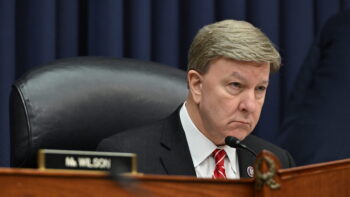
Generals, admirals, members of Congress, captains of industry, and two Defense Secretaries in a row have been pounding the drums for nearly two years on the dangers of sequestration. So far, it appears hardly anyone is listening outside the Beltway — or even on Capitol Hill.
What is appalling is “the lack of engagement by Congress,” retired Republican Senator Kit Bond said at last weekend’s Reagan National Defense Forum in California. “I understand just a week or so ago the House Armed Services Committee had a briefing for members of the House on the impacts of sequester and only 28 of them showed up,” he growled. “That is a really troubling statistic.”
Actually, the stats are worse than that. That 28 includes nine members of the HASC itself, who presumably are already painfully aware of the effects of the ongoing 10-year, $500 billion cut to Pentagon spending. So only19 non-HASC legislators showed up. Not one member of the House leadership showed up. Given what difficult cats legislators are to herd, getting 19 together isn’t bad, but it’s a long way from a 218-vote majority. What’s more, as the crowning touch, the briefing was cut short halfway through so the members could go vote on issues unrelated to defense.
So how successful have pro-defense legislators been at getting the message out to the public and their colleagues? “Well, I don’t know,” said Rep. Mac Thornberry, with what seemed like a slight sigh, when I cornered the HASC Vice-Chairman after a talk he gave in Washington on Monday. “Yeah,” he said, the briefing wasn’t well attended, “but we’ve had several, and so it’s accumulated over time.” (We know about one earlier group briefing, which was even smaller than last week’s, so at least they’re headed in the right direction). “So, we’ve got to keep after it, explaining what the consequences of sequestration are.”
It’s easy to blame all this on Congress, but the White House isn’t helping much either. While Sec. Chuck Hagel and his predecessor Leon Panetta have arguably forcefully against defense cuts, Barack Obama prefers to focus on domestic issues such as rescuing his health care plan.
“The Obama administration hasn’t even tried to articulate a national security narrative beyond counter-terrorism, so it isn’t a big surprise that few care about sequester and readiness,” said one Hill staffer, himself a Democrat. “There is zero public concern about military threats outside of terrorism, so when people say ‘we aren’t ready,’ the answer tends to be ‘so what?’ or ‘fine, maybe we won’t start another war like Iraq.'” (Of course, someone else may start the war instead).
It is Congress, however, that’s the center of the maelstrom at the moment. Both Thornberry and his chairman, Buck McKeon, as well as their Senate and defense appropriations counterparts, are literally locked out of the closed-door conference negotiations on the 2014 budget. “I think there is a lot of interest in replacing the sequester with other savings that are more targeted and a lot smaller,” Thornberry told me, “and I hope that Paul Ryan and Patty Murray” — the heads of the House and Senate budget committees, respectively — “come up with a budget agreement to do that.”
How high are your hopes, I asked him? “Pretty high.”
“There’s always hope,” said HASC’s top Democrat, Rep. Adam Smith, when I spoke to him on Saturday. But, he said, “we have to stand up and be responsible for what’s going on. Just throwing rocks at the building ain’t gonna get anything done.”
Smith had just come off the stage at the Reagan Forum, where he’d given a delightfully withering appraisal of how Congress — and the American people — dug themselves into this hole. (Smith’s dry, acidic wit is something you’d expect more from a member of the British parliament.)
“Until the country understands what legislating is, we’re all in a tough spot,” Smith said. Democracy requires compromise, and it sometimes must be eased along by back-room deals and horse-trading, such as the now-banned practice of earmarks, whose loss Sen. Bond and former Defense Sec. Leon Panetta both lamented on the same panel. “Part of the problem is to get the people to respect that process,” Smith went on. The American people, he said, “wind up with the representatives that reflect what they want.”
Couldn’t we mitigate the sequestration cuts, asked one well-meaning audience member, by making Defense Department spending more efficient?
No, Smith said, we can’t. “The whole efficiency conversation is an excuse for not addressing the larger issue,” he said. “That’s primarily the thing politicians fall back on so we don’t have to cut things or raise taxes.” It’s certainly important to make the Pentagon waste less money, “but you will never eliminate waste and inefficiency from any human endeavor,” Smith said.
Even after falling to a post-2008 low, the budget deficit for fiscal 2013 is still an estimated $680 billion: That’s more than the entire amount the Defense Department spent that year, $607 billion. “You can get all of the efficiencies out of this [i.e. Defense],” Smith said, “but if you don’t step up and say we will cut mandatory spending and raise revenues, you will never save discretionary spending.”
“Far too often politicians promise something for nothing, and the public comes to expect it,” Smith told me afterwards. “If you hadn’t promised it in the first place, you wouldn’t have people going, ‘hey, you told me you could balance the budget through efficiencies — what’re you talking to me about spending cuts and tax increases? I didn’t hear that during the campaign.'”
Nevertheless “politicians are certainly not cowards; we all knew what the health care vote was going to do and yet we took it,” Smith said. “Members of Congress voted for the tax increases and spending cuts in 1990. We voted to cut Medicare in 1997. [But] if you punish those decisions… people get elected who won’t make them.”
You’re not exactly giving an encouraging assessment of our democracy, I told him.
“It wasn’t meant to be an indictment of democracy. It was meant to be a call to arms,” Smith replied. “It’s a plea for a more honest assessment of the challenge. Because I honestly think [that] we can do it, we can meet it — but as long as we’re still imagining that we can balance the budget without cutting spending or raising taxes, it’s going to be tough.”
Multi-ship amphib buy could net $900M in savings, say Navy, Marine Corps officials
Lawmakers gave the Navy authorities to ink a multi-ship amphib deal years ago, but the service has not utilized that power yet.


























